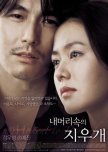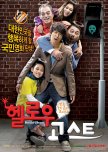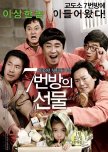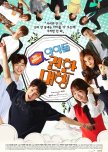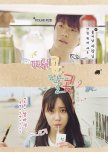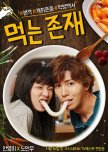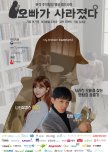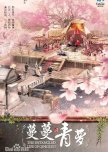
A MASTERPIECE FOR THE AGES
I honestly underestimated this drama. I didn’t expect it to be this GREAT, this PHENOMENAL, this AMAZING?! When Life Gives You Tangerines isn’t just a drama; it’s a masterpiece and a masterclass in storytelling. I had high hopes going into it, but after being let down by a few dramas before, I tried to manage my expectations. However, my gut feeling told me this would be special—and boy, was I right and so, so wrong at the same time! I didn’t just enjoy it; I was completely captivated, and it changed me in ways I can’t fully describe. There was a me before watching this show, and now, there’s a me after. It’s one of those stories that doesn’t just end when the show does; it stays with you and reshapes how you think. I never imagined a drama could make me reflect on my own life so deeply. From the first episode, I was hooked. And by the end, I was left emotionally wrecked in the most beautiful way.This isn’t just a love story—it’s about resilience, survival, and the kind of love that doesn’t need to be shouted from the rooftops. The bond between Gwan Sik and Ae Sun is so pure, so grounded in reality, that you can’t help but feel every emotion they go through. From their awkward yet beautiful first kiss to the way they support each other through everything life throws their way, their relationship is everything I wish for in a partner. It’s not always easy or perfect, but it’s real, and that’s what makes it so powerful. Their connection transcends time, and you feel it in every shared glance, every quiet moment between them. The scene where Gwan Sik jumps into the stormy sea to get to Ae Sun—that scene will forever be etched in my mind. It’s not just about love, it’s about sacrifice, and the lengths people will go to when they care for someone deeply.
And then there’s the love between families. The dynamic between Gwang Rye and Ae Sun is heartbreaking yet beautiful. Gwang Rye’s sacrifice for her daughter, how she worked so hard as a Haenyeo, hoping to spare Ae Sun from that life, speaks to the lengths mothers will go to for their children. It’s such a layered portrayal of motherhood and the ways that generational trauma can shape how we live our lives. Ae Sun’s journey is a reflection of that tension between breaking free from what’s expected and the reality of what she has to face.
The show also delves into the societal dynamics and gender roles that are imposed on women, and it’s something that really stuck with me. The way women are often expected to stay in their place, how the world around them limits their options—When Life Gives You Tangerines doesn’t shy away from showing these struggles. Ae Sun’s character feels like a rebellion in itself. She had dreams, she had ambitions, but life didn’t always give her the chance to pursue them. She wanted to be a poet, but the world she lived in had other plans and challenges for her to overcome first. That tension between following your heart and doing what’s necessary for survival is explored so well.
It’s also a story about breaking generational trauma and crafting your life the way you think it should be lived. One of the most moving scenes for me was when Gwan Sik, sitting at the men’s table, looked over at his family and decided he wanted to eat with them. It’s a simple act, but it means everything. He chooses his family over tradition, over expectations. And that moment, when he gives his daughter his beans, is just one of those gestures that speaks volumes about the kind of father he is. It was a small gesture, but one that said everything about the kind of man he was—and about love in its truest form. Gwan Sik showed Geum Myeong what it is to be a gold standard father, husband, and man. He is the standard. It’s not about grand gestures, it’s about the everyday acts of love that define who you are.
The acting is beyond words. Every actor brought their all to the table, and their performances were so raw and authentic that you couldn’t help but be drawn in. The chemistry between the leads especially IU and Bo Gum is electric, and the way the supporting cast adds depth to the world around them just elevates the entire story.
The cinematography is another element that makes this drama feel almost poetic. Every shot feels like it has meaning, and the way the visuals enhance the story is nothing short of incredible. The quiet moments, the big emotional scenes, everything is framed perfectly, adding another layer of emotion to the narrative.
When Life Gives You Tangerines isn’t just a drama you watch; it’s a drama you live. It stays with you, changes you, and leaves you thinking about the characters long after the last episode. It’s all so beautifully crafted that it feels like more than just a story. It’s an unforgettable experience about how people navigate life, love, hardships and the weight of the choices they make, and it’s one I will carry with me forever.
Full review coming soon. Stay tuned!
Was this review helpful to you?

This review may contain spoilers
It's worth watching in commemoration of Women's Month
Set in the 1950s, this drama follows Ae Sun, a young woman raised in poverty, whose life is marked by hardship, much like the tangerines (the sour and challenging circumstances) surrounding her. Her mother, a struggling haenyeo (female diver), works tirelessly to provide for her family, including two younger children and a second husband, yet barely scrapes by. Ae Sun harbors deep resentment toward her mother’s circumstances and dreams of one day lifting her out of misery. Fierce, determined, and unafraid to stand up for what is right, Ae Sun traverses a world that offers women few choices, resigning them to lives as maids, divers, or housewives.Watching this story unfold has made me profoundly grateful to be a woman in the 21st century, where opportunities and freedom are far greater. IU delivers a compelling performance, making Ae Sun’s struggles feel deeply personal and poignant. The drama also explores the timeless notion of love as an unwavering force—the idea that two people, bound by devotion, can withstand any adversity together. In the past, love seemed simpler: you fought for each other and stayed together no matter the obstacles. Today, such ideals alone are rarely enough to sustain a relationship.
The first four episodes have been great, and for now, I’m eager to continue watching.
UPDATE: I finally finished it, and I must say, it’s such a heartwarming story. It was a series of laughter and tears following Ae Sun’s journey from her childhood to her later years. Life truly has its share of tangerines, but the challenges we face only make us stronger because every cloud has a silver lining. Kudos to each cast member for their outstanding performances throughout the show.
Was this review helpful to you?

cherish ur loved ones.
no bullshi**ng around here. when I tell you I cried in every single episode I did. not only did I cry once in every episode but MULTIPLE TIMES. when I tell you this k-drama hits home hard it reallyyyyy does. esp coming from an immigrant-middle eastern background this really made me more grateful for my parents. it's the perfect k-drama that shows us truly a reality that we live in. like having to work hard to make ends meet for your kids, trying to make them happy, educate them, provide and spoil them, raise them, seeing your kids get married, dealing with death and still having to move forward to put food on the table. it really really had me so emotional and thankful that the producers and story writers thought of all these details that go on in a persons everyday life. I would so recommend this show to have a good cry thankful sesh and to always remember to be thankful for your family, siblings, neighbors, people who adore, care, love and want the best for you. not to mention how gwan sik is the perfect example of how a man should be and how he stood by ae-sun through hardship and ease. the ending had me sobbing but also so happy how it ended. I truly love this k-drama <3 please give it a watchWas this review helpful to you?
Watched this drama a fortnight ago but couldn't bring myself to write its review. Maybe because I had too much on my mind, I couldn't figure out what to write and what not to. So here it is.
This drama is indeed a masterpiece, as per the hype. Its realistic plot, showcasing realistic life issues, distinguishes it from the rest. It shows that not all dreams come true, at least not in your expected timeframe; not everyone makes it to the top, because for many, bare survival is the biggest achievement of life; and your children don't always make you the proudest parents, no matter how preciously you raise them. And in whatever trouble, parents are always your sole savior; no one comes to your rescue except them. And likewise, every child is precious to their parents, regardless of what the world thinks.
Everything about this drama is so true that it's actually heartbreaking. The plot is family-based, circling around parenthood, especially motherhood. Ae-sun's life is depicted from childhood to seventy. Ae-sun is a girl with nothing but Yang Gwan-shik. Although poor, he always stands by Ae-sun and never lets her suffer alone. He does his best to provide for his family till his last breath. Gwan-shik is not only the best husband but also an amazing father. Both Ae-sun and Gwangshik take each other's side even when it's one of them versus their children. Their mutual love is so remarkable that even on his deathbed, Gwanshik asks his children to take care of their mother.
Their eldest daughter, Geum-myung, is the personification of most of the girls, who appear cold to their parents but actually are the warmest. Contrarily, sons are often impudent brats. Daughter are the exact reflection of their mothers, the same loving, caring, even self-sacrificing. Seeing her belittled by her supposed in-laws made me feel for Ae-sun that how hard it is for mothers to watch their children suffer. All the parents raise their children with the best they have and watching their children being looked down upon is extremely heart-aching.
I really admire her courage to let go of her first love, because she was not accepted in his household. And then, she got the man worthy of her. That's how life is, the wronged one gets better than what he previously had, as a compensation. (Personal note: Although I love Seonho, I didn't like his character here. It was too overboard and unrealistic, and both had no chemi development).
Going back to Ae-sun and Gwanshik, their life was far from perfect, they had more of hard days than good days and their life was a continuous struggle. Still they always stood by each other through thick and thin.
This drama is totally unlike the others nowadays. No CEOs, no luxury items, nothing just plain village life, where people silently help each other. Drama has the best direction and storyline. IU is such a versatile actress that no amount of appreciation can do her justice.
I can still write loads about the notions and aspects depicted, but this review has already got too long, so let's just end it here.
Endnote: regarding Gwanshik and Chungseop, and all the men out there, "if he wanted, he would!"
Was this review helpful to you?

words are not enough to describe this
the writing is absolutely masterful. it’s almost like you are living alongside ae sun and gwan sik. I wanted to give myself some time before I wrote this review but I still don’t have the words to describe this. it leaves an ache in you. one that reality brings as you love and lose. as life comes at you with difficulties after difficulties and not until you are far from them can you appreciate those moments. it’s a promise that if you have that same retrospect now than you will LIVE. you will BREATHEWas this review helpful to you?

Such a holy grail kdrama.
When life gives you Tangerines shows every stage of life very beautifully and naturally. The cast , story , cinematography and places are very heartwarming and everything. This drama is so good and felt like a living a life also we all relate to every single character it has. Will make you laugh out loud , cry, happy and sad but also gives you direction & courage you need in your life. It's a must watch 10 out of 10 Masterpiece holy grail kdrama. 🍊🫀(Also may you all find a men like gwan-sik)
Was this review helpful to you?

A beautiful multi-generational story
Oh I sobbed so hard, especially in the last two volumes. The themes — both of the bravery of parenthood and of finding a romantic partner who supports you and your loved ones without thinking twice — are so realistic and moving, and I love the focus on womanhood.I think the drama did take a little while to pick up for me. While the first few episodes have some similar themes, it didn’t hit me as much as the “second gen” story in the later volumes. The romance between Ae-sun and Gwan-sik is cute, and the relationship between Ae-sun and her mother is touching, but it felt like were in “prologue mode,” whereas the parallels really start to shine after the halfway point.
The entire drama, ultimately, is really powered by the long timeline of the drama, and by the end of the drama I felt like I’d really lived a lifetime with these characters, and I didn’t want it to end.
Was this review helpful to you?

when life brings you to tears
i must say that the writing was excellent from start to finish and very well thought out. it’s meant for people who love slice-of-life stories or an excellent tearjerker. the cinematography was breathtaking. the sets and costumes fit the time periods they were meant to represent, and the overall scenery was gorgeous. i have no notes- except for two actors whose skills were somewhat lacking compared to the rest of the cast. however, I’m letting this one slide. IU has once again proven why she is a great actress by taking on different roles within the same drama. this drama wouldn’t have been the same without her.Was this review helpful to you?

A Poetic Love Story That Grows with Time
When Life Gives You Tangerines is a beautifully rendered meditation on love, resilience, and the slow passage of time. What captivated me most is how it feels profoundly intimate—every glance, every subtle gesture builds decades of emotion. IU and Park Bo-gum deliver quietly powerful performances that breathe warmth into their characters, while the production design and cinematography evoke Jeju's cultural soul with stunning clarity and nostalgia. It’s not a fast-paced drama, but that languid rhythm lets you savor the relationships, the generational shifts, and the unwavering bond between Ae-sun and Gwan-sik. If you appreciate deeply human storytelling that lingers long after the final episode, this one stays with you.Was this review helpful to you?
This review may contain spoilers
A heartfelt tale at the struggles of poverty with some continuity and casting issues
The drama is first and foremost a slice of life drama so it does not have the usual protagonist and antagonist, conflict and resolution arc so it is not for everyone. It is a little slow as it covers the stories of some of the support cast, which adds substance to the drama but may feel draggy.The production quality is of very high standard. The set, lightning, costume really show how village life in Jeju in the past is like. The script is intricate as the lines between the cast felt natural. The direction of the drama is great as well. Most of the cast were superb in their acting, especially the support cast of aunties who were Ae Sun's mother's friends. Yeom Hye Ran who played Ae Sun's mother was exceptional. Kim Tae Yeon who played the main young Ae Sun was great as well. They both were convincing as the protective mother and confident child. This part of the story, although short, tugged at my heartstrings the most. This background story added intricacy to the drama. IU and Park Bo Gum have good chemistry and are relatable as a couple as well.
IU, having dual roles of playing both the young Ae Sun as well as her daughter, Yang Geum Myeong, cemented her role as an actress, although she came from a singing background. She was competent in playing her younger role with Park Bo Gum as a poor but proud mother, and later on even better as Yang Geum Myeong. It possible that IU is still better when depicting modern characters . The scene where Yang Geum Myeong father's shouted her name when she was griping to her mother about not wanting to play the "pillar of the family" role was exceptionally good - one can feel that Geum Myeong's motions totally sank when she knew she was in the wrong.
The main and later part of the drama is where I have minor grips with casting, and major continuity issues. Firstly, Park Bo Gum as the younger Yang Gwan Sik is incredibly handsome. His character setup was that he was physically fit enough to be a national athlete, handsome, who gave them up in order to marry Ae Sun and provide for the family. He is also down-to-earth and a man of a few words. Park Hae Joon was cast as the older Yang Gwan Sik despite looking nothing like Park Bo Gum and being way too old. Yang Gwan Sik is 37-39 when her daughter entered university.
His character also had continuity issues. The idea of him being "handsome and athletic but gave it up" character script was not explored. His identity switched a 180 degree to an ailing father and sea-worn fisherman with a haggard look, even though his age is only around 37-38. When he developed cancer, he is only 55-57, but was portrayed as likely 60 over years old.
Similarly, Moon So Ri was cast as the older Ae Sun when her character is supposed to be much younger. When she first appeared, she was supposed to be 37-38, but was presented as something in her late forties to early fifties. Her character was displayed as someone who is meek - the only time she spoke up was when her daughter was mistreated by her potential in-laws and when she pulled her frenemy's hair. Her personality felt a little too different from who she was like in her teenage and motherhood years.
Despite these character continuity issues, Yang Gwan Sik and Moon So Ri made up for that lack in their acting.
IU's acting as a mother (both as younger Ae Sun and later asGeum Myeong) was slighter less impressive and she lacked a little maternal instinct and her chemistry with her children. These scenes were far and few in-between though.
Overall. this is a good drama for the start of 2025. It is just impossible to binge through so few episodes a time is still recommended.
Was this review helpful to you?

This review may contain spoilers
A simply beautiful story about family and life successfully told.
This will be the first review I have written on MDL.When Life Gives You Tangerines 🍊 (2025)
I knew this drama would end up being similar to my expectations, but the storytelling elevated the experience further. For such a simple story, the storytelling was stellar, along with the cinematography, to keep the audience on their toes and their hearts softened. The history of Jeju was richly presented by aligning the struggles of villagers and Aesun and Gwansik, whose lives were filled with emotional, grand and simple moments. I was reminded of my parents whenever Aesun and Gwansik, as grandparents, stood by each other, and so I resonated with the sad, happy, and funny moments in the story, especially through the eyes of Geum-myeong and how she ended up being their treasure and so-called princess.
Besides the main story, side characters were tied to the storyline and were important to the lives of the main characters, which I enjoyed a lot for a slice-of-life drama. The direction and visuals, helmed by the director of critically acclaimed dramas like My Mister, Signal, and Arthdal Chronicles, left me breathless. The budget was intentionally spent, and I appreciated that a lot. The actors and actresses did their job, especially IU, who played Ae-sun and Geum-young and showed her versatility as an actress in between the relationship of a mother and her daughter. So did Park Bogum, who I didn't see in a project elsewhere except Reply 1988 in 2015, he crafted the image of a young father to his grown-up self, played by Park Hae-Joon. Moon So-ri was as great as Ae-sun, she felt like a real person to me with all of her emotions as a mother who once had dreams of her own. I never felt a disconnection between the same characters played by two different actors and actresses.
Volumes 1-4 each had a central theme that resembled a tribute to the younger generation and a great thank you to the elder generations. From the dreams of youth to the hardships and regrets of adulthood and parenthood, to the uncertain events in history that struck the country were covered in the seasons of time, fall, summer, winter, and spring.
The ahjummas and other roles, such as Bu Sang-gil and Yeom Hyeran, convinced me that their characters were, in fact, just as important in bringing the scenes of family and community that stood out to me in symbolism out of all the dramas I've seen. Kim Seon-ho was wonderful too. Two mother-daughter relationships were excellently written, and the messages of the story were strongly supported through their scenes and how they contributed to the growth of the female characters throughout. I would like to write about the scenes that impacted me the most, but I will mention that the death of Dong-myeong truly broke me. Bogum as Gwan-sik's cries were haunting, and IU as Ae-sun in complete denial hurt me badly. In a way, I will never forget, and how they have not forgotten what happened to him from the guilt and regret that arose in their hearts and minds.
The music wasn't that spectacular for me, but I still was able to cry at quite a few scenes because of the powerful writing and acting. The rewatch value remains low since I never rewatch dramas fully, but for anyone who would rewatch, I would suggest they skip many moments in the middle of the drama instead. The timelines involving the lives of Geum-myeong and Eun-myeong were not captivating or interesting for the most part, but there are still many moments to look forward to. I will be thinking about this show briefly whenever I think of my family, especially my mother. A lot of lines were special to me.
I loved that Ae-sun was able to write poetry, including her long-lasting marriage in the warm spring and that Gwan-sik's last moments had him thinking about the love of his life. This show was able to focus on the romance of the parents in the last episode and how their love had them walking hand-in-hand and overcoming each hardship together. The last line is deeply emotional and summarizes the message of the story,
"To their seasons,
once so young and still so tender.
With remorse, gratitude, and the deepest respect.
Here's to all you have been through."
Was this review helpful to you?

My highest score.
This was shocking to me because it's my highest score for a drama on here. 8.5/10. Please watch it, you won't regret it. IU needs an Oscar because she stood out the most to me. Why does this need 300 characters lol? just realized this is my first review on this website so it's serious. Get the tissues ready. Never in my life did I cry for every single episode and this actually came true.Was this review helpful to you?

 2
2 3
3 1
1 1
1




